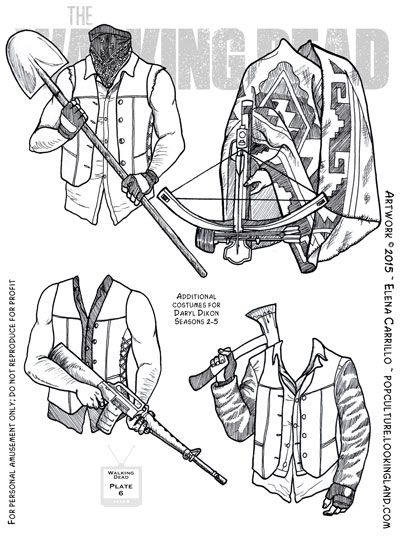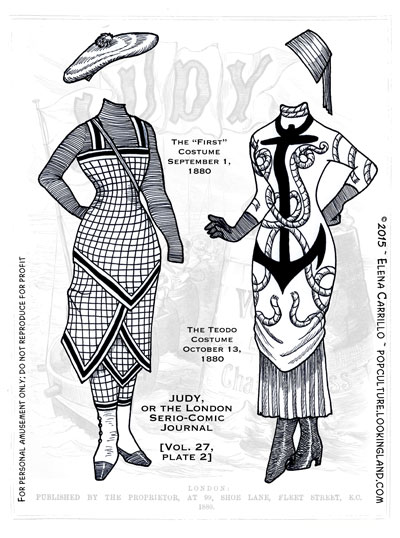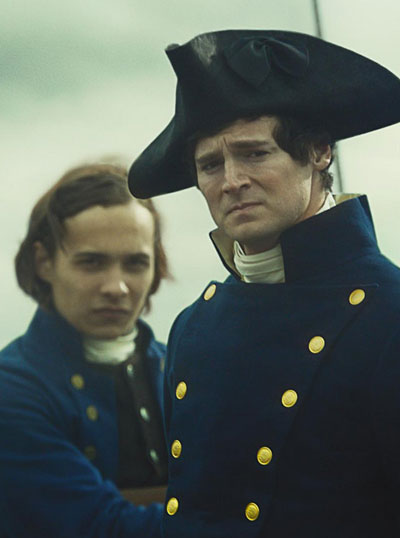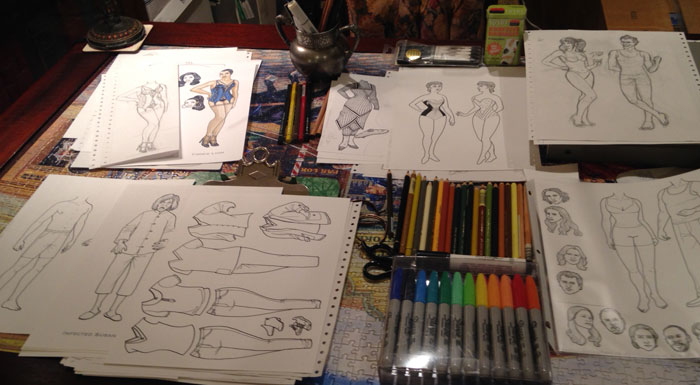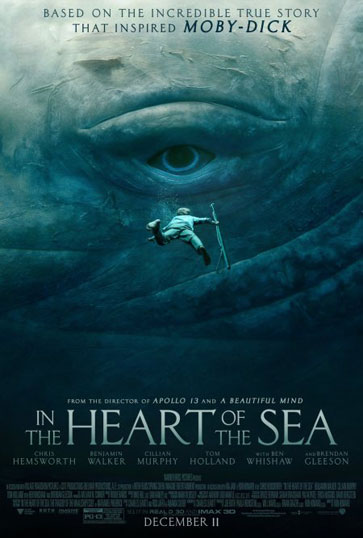 Let’s get one thing clear: I really am okay with adaptation as its own art form. I’m sorely disappointed that this movie veered so far from the actual history of the Essex and from Nathaniel Philbrick’s telling of that tale, but I can put that aside. It’s not the movie we got, so dredging up the comparisons is academic.
Let’s get one thing clear: I really am okay with adaptation as its own art form. I’m sorely disappointed that this movie veered so far from the actual history of the Essex and from Nathaniel Philbrick’s telling of that tale, but I can put that aside. It’s not the movie we got, so dredging up the comparisons is academic.
Standing on its own, In the Heart of the Sea is interesting, but kind of a technical mess. The script is weak, the characters are not well drawn, the actors aren’t really given good dramatic business to do (top billing goes to several who seem to have had no more than a dozen lines/scenes), the camerawork is confoundingly shifty and weirdly angled, and there’s a narrative framework overlaid on the action that’s distracting, kind of pointless, and historically misleading (and feels to me like it misses the whole point of the Moby Dick connection, but that could be a whole post all on its own).
All that said, the cgi whales are much better than I anticipated, the sailing and whaling business is compelling, and you can see moments ~ tiny flashes ~ where this could have been brilliant in the hands of a different director or even just with a stronger script.
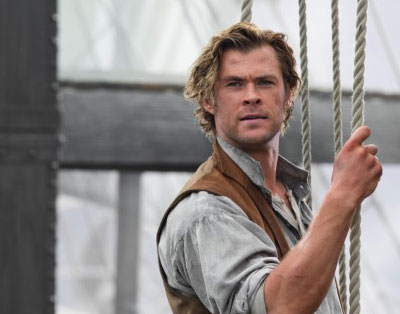 And how about that gloriously wasted cast?
And how about that gloriously wasted cast?
Chris Hemsworth garbles all over his wildly varying accent, unfortunately. His Owen Chase is thoroughly not likable. In fact, I began to think this was going to be a story about his hubris and ultimate redemption. But it’s not. He’s a self-righteous smug jerk from the start and while he gets knocked down a peg, he’s still a self-righteous smug jerk to the bitter end. I had moments when I just wanted the whale to eat him. Or the other sailors. Because, you know, this is a story about open-boat survival and cannibalism is going to happen.
I will add this about Hemsworth’s performance: his accent may be a total mystery, but his transformation is shocking once they’re adrift. His sunken visage is a horror to behold.
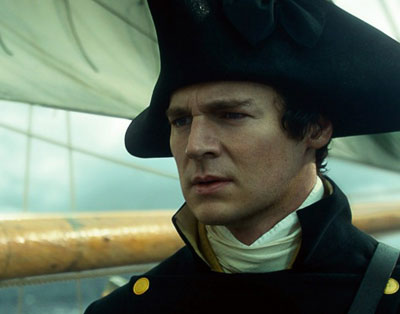 Benjaman Walker plays Captain Pollard and does a nice job embodying an inexperienced sailor fighting to maintain authority that’s been given to him, unearned. But the script has the character make spectacularly obvious bad choices (even the audience knows they’re bad). It undercuts any chance of realism, and makes him a bit of a dolt.
Benjaman Walker plays Captain Pollard and does a nice job embodying an inexperienced sailor fighting to maintain authority that’s been given to him, unearned. But the script has the character make spectacularly obvious bad choices (even the audience knows they’re bad). It undercuts any chance of realism, and makes him a bit of a dolt.
Even so, of all the characters, Pollard’s the only one given what could be considered an actual arc of development: he starts out maligned, becomes insufferable, obstinately refuses to believe in the errors of his ways, but ultimately does the right thing. And he comes away heroic and vaguely interesting, which none of the others can claim.
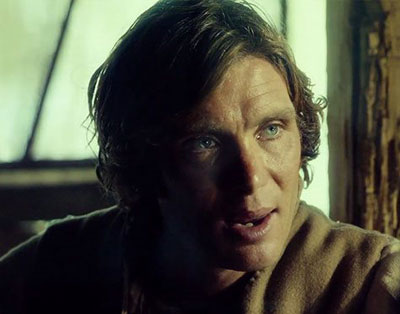 Poor Cillian Murphy plays the bland childhood pal of Owen Chase, Matthew Joy. It’s a bloody crime that Howard made this actor suffer under extreme filming conditions for a role that consisted of a man twice refusing a drink and then saying goodbye to Chase. That’s literally all he gets to do here. Why, Howard? Why? You cast an actor of this caliber to do nothing.
Poor Cillian Murphy plays the bland childhood pal of Owen Chase, Matthew Joy. It’s a bloody crime that Howard made this actor suffer under extreme filming conditions for a role that consisted of a man twice refusing a drink and then saying goodbye to Chase. That’s literally all he gets to do here. Why, Howard? Why? You cast an actor of this caliber to do nothing.
Even with the nothing he’s given, he looks good on screen. I will say, though, there’s a transition once they’re set adrift where Joy becomes completely unrecognizable from one scene to the next because of the extremity of the sailors’ condition. It was very jarring. For a moment I didn’t even know it was him and that took any hope for tension out of what might have been a nice moment.
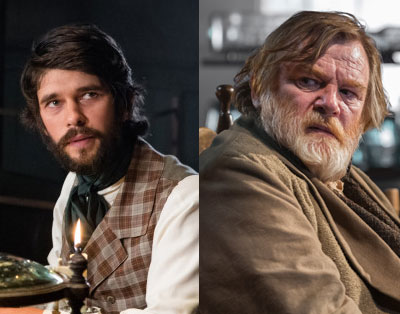 Brenden Gleason and Ben Whishaw play Old Tom Nickerson and Herman Melville, respectively. This is the narrative framework that just didn’t need to be there. It interrupts the action and doesn’t really serve as anything but expository filler and a lot of wink-winking and nudge-nudging about Moby Dick to come. Everything in the framework feels like Howard doesn’t trust us to “get it” unless it’s all spelled out.
Brenden Gleason and Ben Whishaw play Old Tom Nickerson and Herman Melville, respectively. This is the narrative framework that just didn’t need to be there. It interrupts the action and doesn’t really serve as anything but expository filler and a lot of wink-winking and nudge-nudging about Moby Dick to come. Everything in the framework feels like Howard doesn’t trust us to “get it” unless it’s all spelled out.
The actors do their darndest to deliver ham-fisted dialogue and get emotional about events 30 years past. It’s actually painful to watch. I want an edit of the film in which this (and an equally ham-fisted scene at the end regarding a board of inquiry) has been excised–and the time is used to develop the characters on the boat instead.
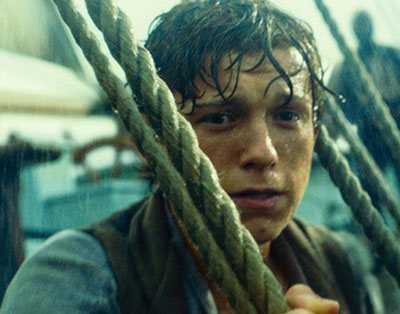 Tom Holland plays Young Tom Nickerson. This kid has serious acting chops and he does well in the role, but his arc is really weird. If we’re to believe he becomes crotchety Old Tom Nickerson, he certainly shows no signs of the terrible trauma of this voyage in his closing moments with Owen Chase. He suffers well on the voyage, but how it scarred him so deeply to become silent and reclusive on the matter is glossed over.
Tom Holland plays Young Tom Nickerson. This kid has serious acting chops and he does well in the role, but his arc is really weird. If we’re to believe he becomes crotchety Old Tom Nickerson, he certainly shows no signs of the terrible trauma of this voyage in his closing moments with Owen Chase. He suffers well on the voyage, but how it scarred him so deeply to become silent and reclusive on the matter is glossed over.
I can think of many ways they could have given him a more powerful story and a more powerful connection to Chase that could have actually resonated. As it is, though, despite all of Holland’s fine abilities, he’s just a stock neophyte sailor who is hopelessly star-struck by Chase who hasn’t really earned that from him.
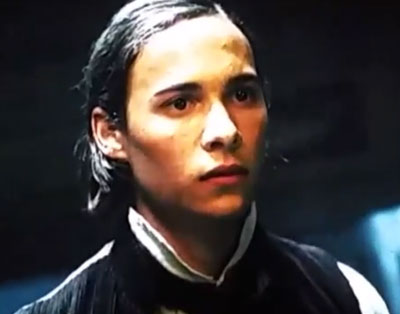 Finally, I want to say something about Frank Dillane’s Henry Coffin (rechristened Henry since his real name was also Owen–we can’t have that in a movie where everyone should be called by last names anyway). I think Howard was trying to make this character antagonistic, but it never plays out. Yeah, he says snotty and ominous things, but he’s also treated negligently by both Pollard and Chase. His flipping out after the sinking is plain weird and his subsequent sacrifice powerless because we have to assume all the feelings he has for his cousin from one brief scene in which he gets turned out like a dog. Is his sacrifice heroic or is it cowardice? For me, this is the high tide of what men do to survive and it just doesn’t work. No fault on Dillane; he’s just not given enough to work with.
Finally, I want to say something about Frank Dillane’s Henry Coffin (rechristened Henry since his real name was also Owen–we can’t have that in a movie where everyone should be called by last names anyway). I think Howard was trying to make this character antagonistic, but it never plays out. Yeah, he says snotty and ominous things, but he’s also treated negligently by both Pollard and Chase. His flipping out after the sinking is plain weird and his subsequent sacrifice powerless because we have to assume all the feelings he has for his cousin from one brief scene in which he gets turned out like a dog. Is his sacrifice heroic or is it cowardice? For me, this is the high tide of what men do to survive and it just doesn’t work. No fault on Dillane; he’s just not given enough to work with.
About the Music: The score is not epic. It’s not memorable coming out of the theater. Like much of the rest of the film, we get a by-the-numbers soundtrack. It has a few nice riffs, but overall another disappointment to me. An epic score can elevate an otherwise lukewarm film, but this was mostly a miss.
About the Cannibalism: This could be a whole ‘nother post in itself. I will confine myself to remarking that there’s good and bad in terms of the way with which it’s dealt. Good that Howard addresses it, but bad in the handling. And I don’t mean that they needed to show it (I’m ghoulish, but not that ghoulish). I’m just talking about the historical reality of it and the attitudes of the day toward the Custom of the Sea. It’s really approached here with a 21st century mindset on some levels. Particularly in the aftermath.
In Summation: I remember when Howard used to be able to tell a great story with really amazing characters. This movie is a decent adventure story and worth a watch, but squanders the talents of its actors and spends way too much time developing characters in the future who aren’t needed to begin with ~ instead of making whole men of the characters in the present who matter the most.
All that said, I still can’t help but recommend the book. While this is kinda entertaining as a sea-faring yarn in spite of itself, the true story of the Essex is ten times more complex, more dramatic, and more terrifying.
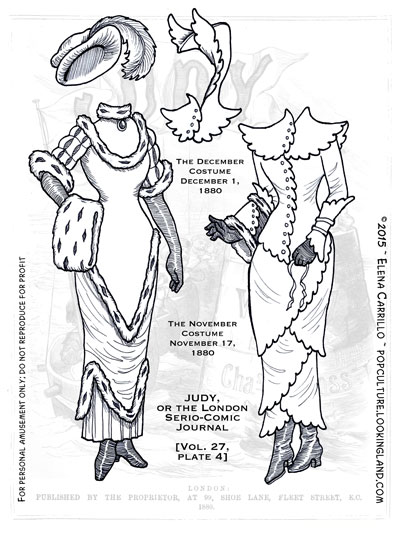 Today for Judy Tuesday we have a couple of nice winter-themed costumes that go well with the season.
Today for Judy Tuesday we have a couple of nice winter-themed costumes that go well with the season.



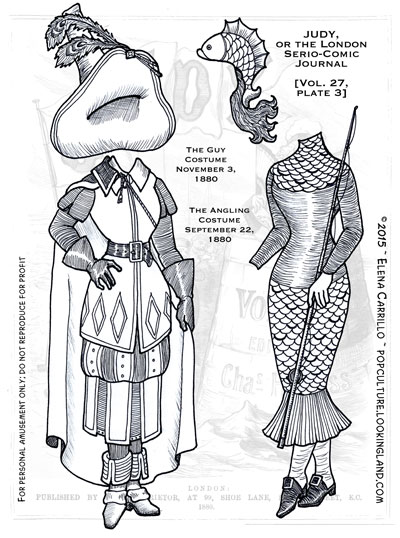
 Let’s get one thing clear: I really am okay with adaptation as its own art form. I’m sorely disappointed that this movie veered so far from the actual history of the Essex and from Nathaniel Philbrick’s telling of that tale, but I can put that aside. It’s not the movie we got, so dredging up the comparisons is academic.
Let’s get one thing clear: I really am okay with adaptation as its own art form. I’m sorely disappointed that this movie veered so far from the actual history of the Essex and from Nathaniel Philbrick’s telling of that tale, but I can put that aside. It’s not the movie we got, so dredging up the comparisons is academic. And how about that gloriously wasted cast?
And how about that gloriously wasted cast? Benjaman Walker plays Captain Pollard and does a nice job embodying an inexperienced sailor fighting to maintain authority that’s been given to him, unearned. But the script has the character make spectacularly obvious bad choices (even the audience knows they’re bad). It undercuts any chance of realism, and makes him a bit of a dolt.
Benjaman Walker plays Captain Pollard and does a nice job embodying an inexperienced sailor fighting to maintain authority that’s been given to him, unearned. But the script has the character make spectacularly obvious bad choices (even the audience knows they’re bad). It undercuts any chance of realism, and makes him a bit of a dolt. Poor Cillian Murphy plays the bland childhood pal of Owen Chase, Matthew Joy. It’s a bloody crime that Howard made this actor suffer under extreme filming conditions for a role that consisted of a man twice refusing a drink and then saying goodbye to Chase. That’s literally all he gets to do here. Why, Howard? Why? You cast an actor of this caliber to do nothing.
Poor Cillian Murphy plays the bland childhood pal of Owen Chase, Matthew Joy. It’s a bloody crime that Howard made this actor suffer under extreme filming conditions for a role that consisted of a man twice refusing a drink and then saying goodbye to Chase. That’s literally all he gets to do here. Why, Howard? Why? You cast an actor of this caliber to do nothing. Brenden Gleason and Ben Whishaw play Old Tom Nickerson and Herman Melville, respectively. This is the narrative framework that just didn’t need to be there. It interrupts the action and doesn’t really serve as anything but expository filler and a lot of wink-winking and nudge-nudging about Moby Dick to come. Everything in the framework feels like Howard doesn’t trust us to “get it” unless it’s all spelled out.
Brenden Gleason and Ben Whishaw play Old Tom Nickerson and Herman Melville, respectively. This is the narrative framework that just didn’t need to be there. It interrupts the action and doesn’t really serve as anything but expository filler and a lot of wink-winking and nudge-nudging about Moby Dick to come. Everything in the framework feels like Howard doesn’t trust us to “get it” unless it’s all spelled out. Tom Holland plays Young Tom Nickerson. This kid has serious acting chops and he does well in the role, but his arc is really weird. If we’re to believe he becomes crotchety Old Tom Nickerson, he certainly shows no signs of the terrible trauma of this voyage in his closing moments with Owen Chase. He suffers well on the voyage, but how it scarred him so deeply to become silent and reclusive on the matter is glossed over.
Tom Holland plays Young Tom Nickerson. This kid has serious acting chops and he does well in the role, but his arc is really weird. If we’re to believe he becomes crotchety Old Tom Nickerson, he certainly shows no signs of the terrible trauma of this voyage in his closing moments with Owen Chase. He suffers well on the voyage, but how it scarred him so deeply to become silent and reclusive on the matter is glossed over. Finally, I want to say something about Frank Dillane’s Henry Coffin (rechristened Henry since his real name was also Owen–we can’t have that in a movie where everyone should be called by last names anyway). I think Howard was trying to make this character antagonistic, but it never plays out. Yeah, he says snotty and ominous things, but he’s also treated negligently by both Pollard and Chase. His flipping out after the sinking is plain weird and his subsequent sacrifice powerless because we have to assume all the feelings he has for his cousin from one brief scene in which he gets turned out like a dog. Is his sacrifice heroic or is it cowardice? For me, this is the high tide of what men do to survive and it just doesn’t work. No fault on Dillane; he’s just not given enough to work with.
Finally, I want to say something about Frank Dillane’s Henry Coffin (rechristened Henry since his real name was also Owen–we can’t have that in a movie where everyone should be called by last names anyway). I think Howard was trying to make this character antagonistic, but it never plays out. Yeah, he says snotty and ominous things, but he’s also treated negligently by both Pollard and Chase. His flipping out after the sinking is plain weird and his subsequent sacrifice powerless because we have to assume all the feelings he has for his cousin from one brief scene in which he gets turned out like a dog. Is his sacrifice heroic or is it cowardice? For me, this is the high tide of what men do to survive and it just doesn’t work. No fault on Dillane; he’s just not given enough to work with.